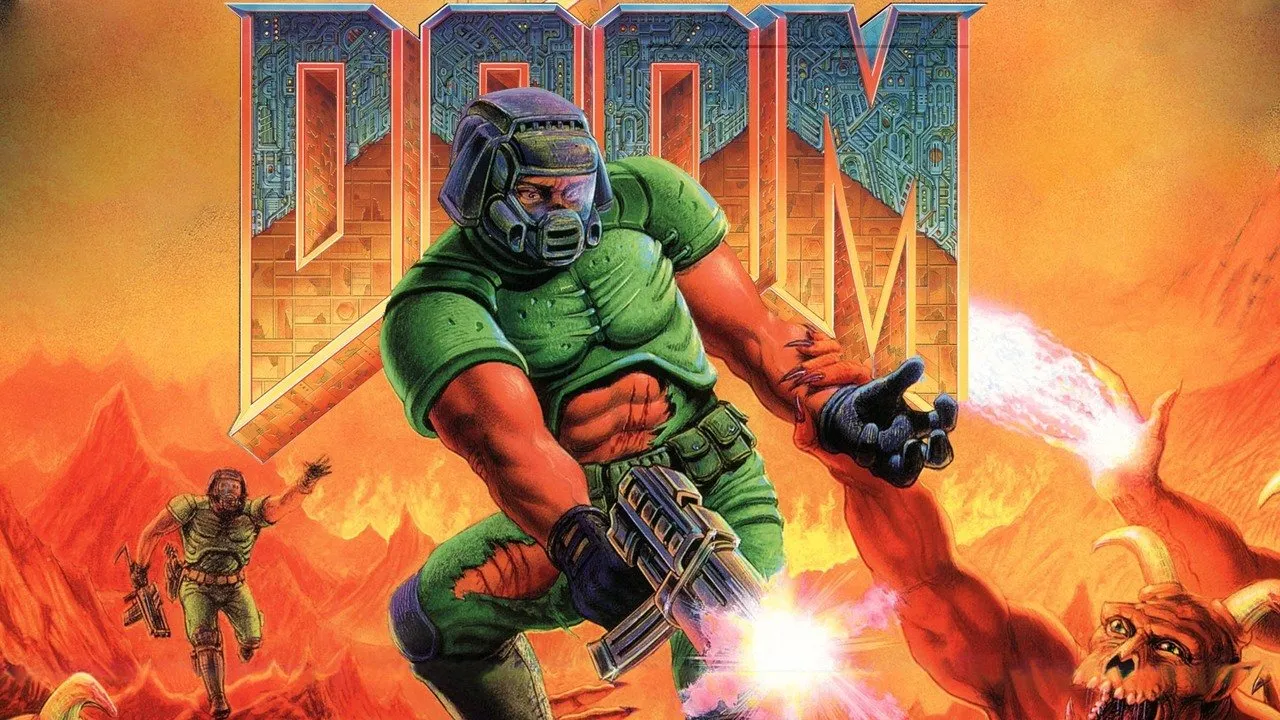
Doom is a 1993 first person horror shooter with heave science fiction themes developed by id Software. It was released as shareware and distributed by e-mail. The game originally contained three chapters comprised of nine levels each, but in 1995 a retail version was released that had an additional fourth chapter.
Development
Development on the game started in 1992 after John Carmack had finished the new Doom 3D game engine. The most noticeable feature of it was, at the time, its realistic 3D graphics, but it was not the most important. What was arguably more impactful was the texturing of all surfaces, and lighting. Whereas, id's previous game Wolfenstein 3D's floor and ceiling were flat colours and all rooms were lit just the same, Doom featured custom textures, also giving the impression of a skybox in outdoor areas. Custom colour palettes to light each room differently and use darkness to build the horror atmosphere, and also use some modifications to them in order to convey certain effects the player would experience, such as berserk mode. Another big difference was that the levels were highly dynamic for the time, where the player could walk on staircases, use platforms and lifts and some events could modify the level with different rooms or create and destroy bridges. Another major improvement was adding stereo sound which gave the player a better understanding of distance and location in respect to his/her enemies.
The 3D effect is mostly an illusion though, one used to great effect. The levels are created as 2D planes with the height differences being stored somewhere else. This means that the game is rendering in 2D, and later shifting the height where needed. This technique is used in modern games as well to create massive outdoor environments. This gives the player a 3D perspective while keeping loading times short enough that the game would run well the computers of 1993, however it is impossible to create rooms one on top of each other.
Another major feature of this engine is its modular data file storage, meaning that data caches can be created and swapped for the original in order to change or add content. This gave rise to WADs (short for "Where's All the Data?"). Thousands of WADs were created by fans, some of which were just variations of the original Doom style, other adding different art, enemies, weapons and scenarios. Among them were adaptations of other popular games or movies such as Dragonball Z, Pokemon, Sailor Moon(lol, definitely not what I imagine when I think of Doom), Batman, Predator, Aliens, Terminator or Beavis and Butt-head. I don't think anyone knows how many there were made, but the idgames FTP archives contains over 18000 WADs, some of which gave rise to aspiring talent, such as Tim Willits, who later became lead game designer at idgames.
Setting, Plot and Influences
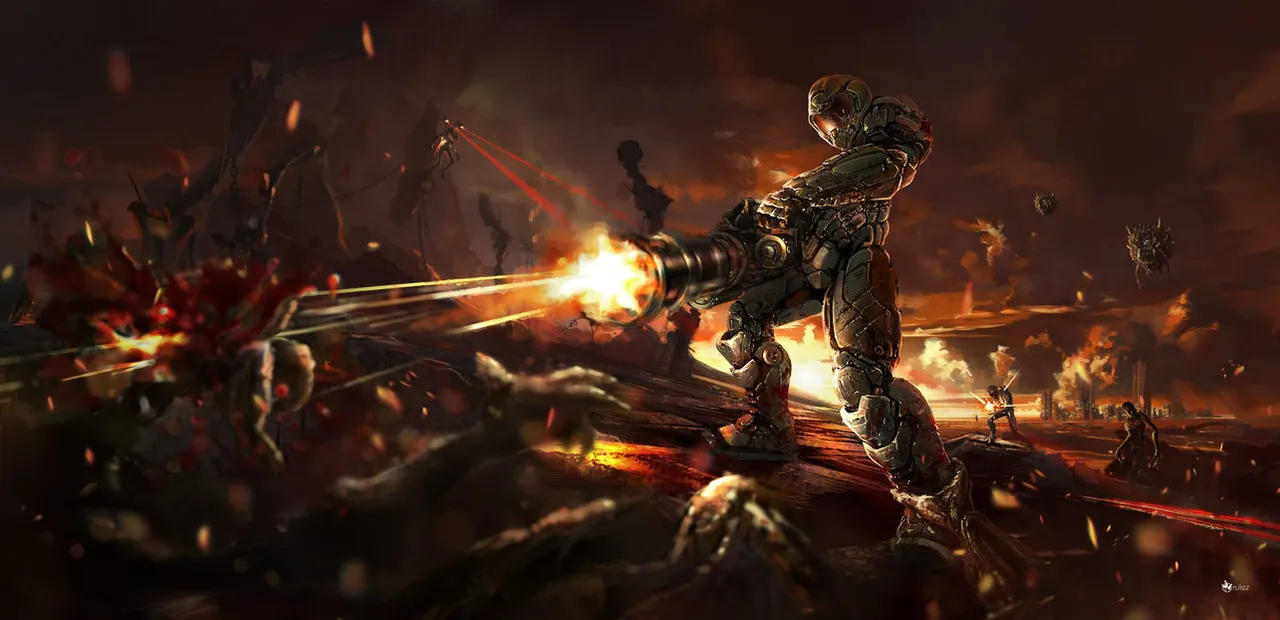
This setting is mainly inspired by the science fiction hit movie Aliens and horror movie classic Evil Dead II. The name was picked by John Carmack from the movie The Colour of Money in which Tom Cruise' character replies, with a cocky grin on his face, to a nameless character in the movie who asks him "What you've got in there?", his response being "Doom". Apparently this was John's view on their company springing to life, just like the character in the movie, to cause chaos in the video game industry. Other influences for the game design and hectic combat would come from the classic arcade game Pac-Man, or Horizon V and even Street Fighter I.
Most of the background for the events in Doom are told through the game manual and between missions through text. It gives information on the player controlled character, only known as the Doomguy, who was punitively sent to Mars for punching a superior officer. Mars is the site of military research on teleportation conducted by the Union Aerospace Corporation on Mars' moons, Phobos and Deimos. This planet and its moons are known to be the dullest assignment imaginable a marine can face. But all is about to change once such an experiment goes horribly wrong and computers on Phobos malfunction, Deimos completely disappears and through the Phobos gate, demonic being start pouring in.
Spoilers ahead (though by now, you should know the gist of Doom): After these events the player is sent to Phobos with only a pistol to investigate, along with a team, which gets wiped out. As the Doomguy can't use the ship on his own, he has no choice but to fight through the hordes of demonic enemies along with possessed marines to keep them from invading Earth. This first level is the only one present in the shareware version of the game. This series of levels through Phobos facilities end with the player teleporting to Deimos and being overwhelmed without a way back. Thus, the second chapter begins, called "The Shores of Hell", in which the player once again fights an onslaught of monsters through the complex similar to the one on Phobos, but altered by demonic architecture. It ends with the defeat of the Cyberdemon when the marine finds out that Deimos is now floating above the gates of Hell. In the third chapter, called "Inferno", the marine climbs down from Deimos and fight his way to fight the Spider Mastermind behind the invasion. Upon victory against this being the player has proven to be "too tough for Hell to contain" and uses a doorway to Earth to find it in shamble. In the fourth chapter from the Ultimate Doom version, the marine fights the hordes on Earth in locales varying from high tech military complexes to demon temples.
Gameplay
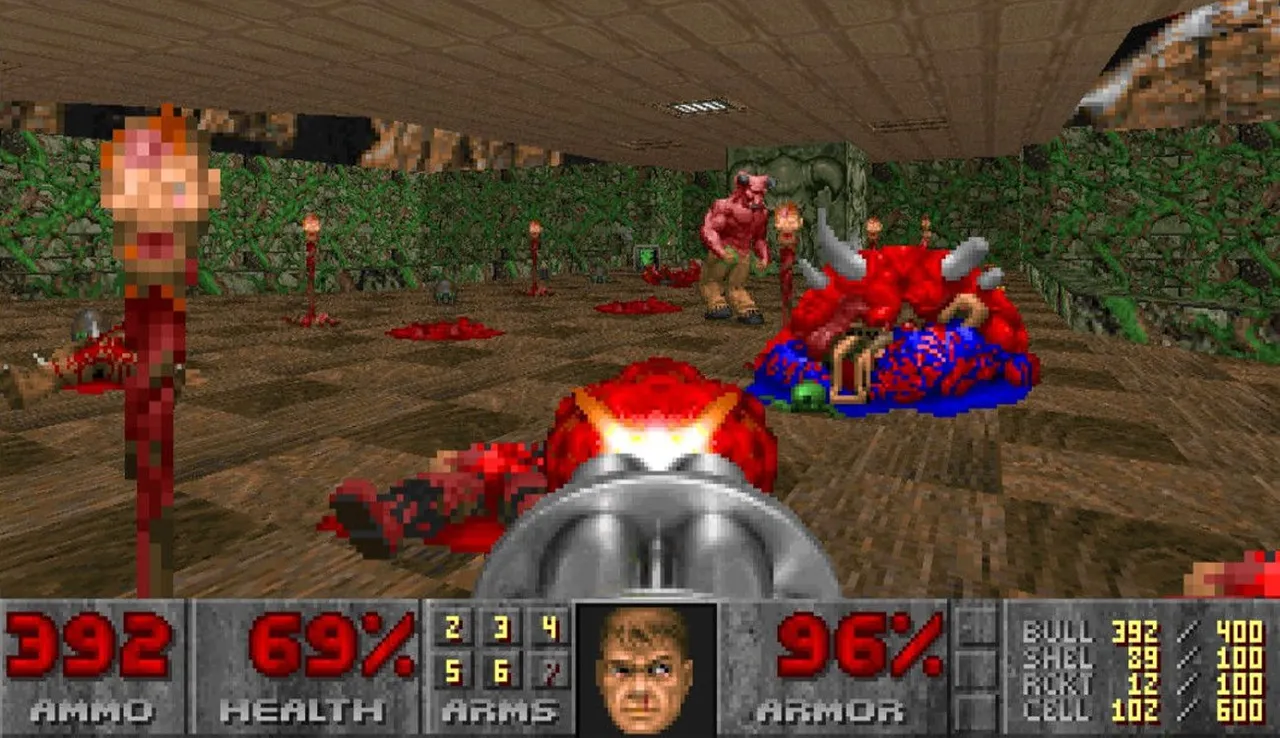
The first person perspective along with the pseudo-3D environment give the player perspective on the battlefield in which he is tasked of traversing, with the goal of every level is to find the exit. To do this the player must overpower the seemingly unending horde of demons, ranging from low level grunts, to fast or ranged, to big and bulky, and even invisible enemies. To fight them the player has access to a whole arsenal of, now staple, weapons, such as a powerful melee chainsaw, to a small pistol you start with, to the now iconic double-barrel shotgun, to miniguns and plasma weapons, to rocket launchers, and finally to the devestating BFG 9000(Big Fucking Gun), whose naming standard has had appearances throughout the gaming industry, one such instance finding its way into the hit MOBA, League of Legends, where a powerful item the player uses is the BF Sword.
Other obstacles the player must overcome are light puzzles like finding the right keycard to open the right door in order to progress, or different mini challenges to complete such as the room closing in to crush the player if not completed in time, or gas chambers that need to be traversed. To overcome them, there are multiple power-ups that the player can pick up which range from extra durability (200 health points, instead of the base 100), time limited invulnerability, nightvision, computer maps that reveal all areas of the current level, or a backpack to double the amount of ammunition the marine can carry. Along with these are the general purpose medikits which restore a portion of lost HP, armour shards and ammo packets.
There were several cheat codes for the single player missions, most notorious of which were IDKFA that gave access to all weapons and keycards, IDDQD that enabled godmode which made the player invulnerable and IDSPISPOPD which turned on no clipping and enabled the player to walk through walls. This last cheat was a nod to a joke that was common on Doom forums, initially starded by Eli S Bingham where he suggested that the next game in the series shouldn't have a cool sounding name such as DOOM, but instead be called Smashing Pumpkins Into Small Piles Of Putrid Debris, thus prompting rise to the SPISPOPD joke. Along the single player campaign, there were also two multiplayer modes: a cooperative one where two players would join forces to fight the demonic invasion, and Deathmatch which would become a staple of the FPS genre, where players would fight each other to the death.
Reception and Expansions
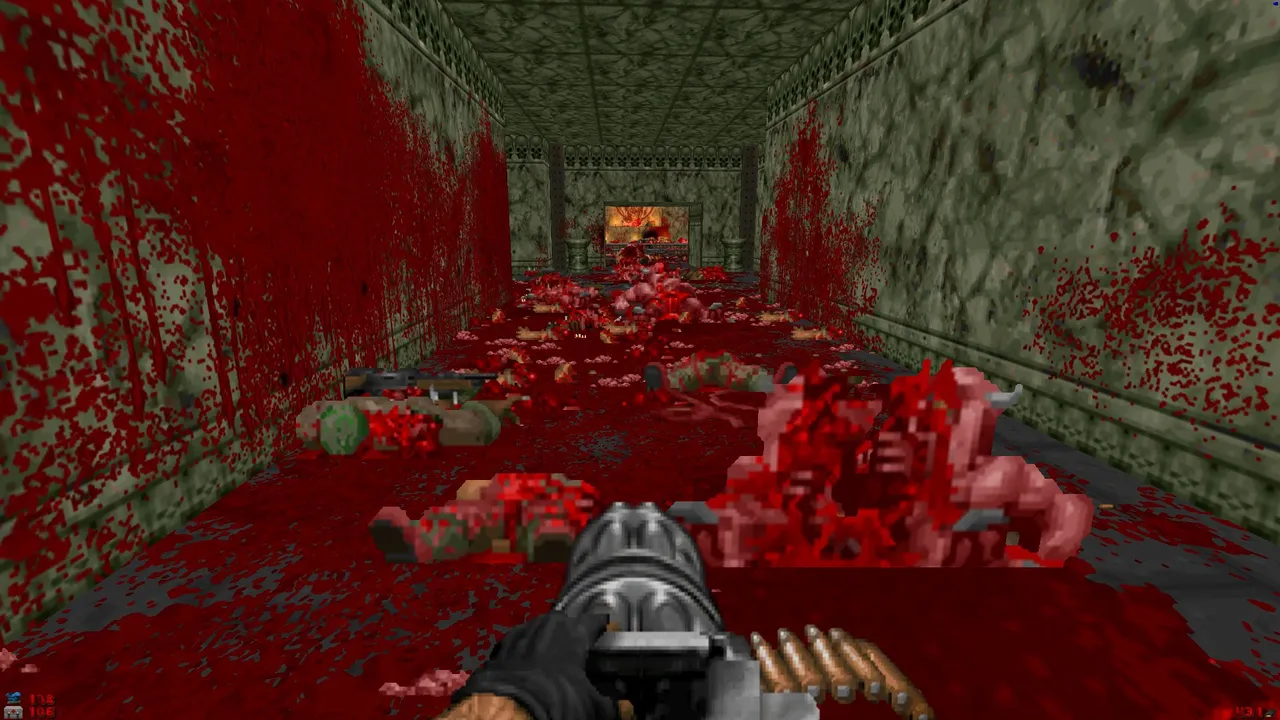
The game was released to critical acclaim and fan praise garnering a total score of 90/100 on Metacritic. It revolutionised the gaming industry, and the FPS genre especially, frequently finding its way on lists of best games of all time, or most influential games of all time done by several large publications. It has made its appearance in movies, other games, comic books, and even becoming the subject of the book Masters of Doom by David Kushner. It is believed that the game sold well over 2 million physical copies by 1999, but has been played by about 20 million people in the first two years after release in the USA alone. id Software was raking in about 100000$ per day while selling copies at 9$ each.
But along with success came numerous controversies due to its graphic gratuitous violence and satanic imagery. It was among the first games to be given an M(mature) rating by the Entertainment Software Ratings Board(ESRB), and was criticised by religious organisations and government officials alike. It also garnered alot of attention after the Columbine High School massacre, whose perpetrators were avid fans of, and who have made several custom levels for the game.
The game had a sequel in 1994 called Doom II: Hell on Earth that was released along with in the Ultimate Doom collection in 1995. In the year 2000 Doom 3 was announced with a fanfare and was to have realistic graphics and more interactivity. It finally arrived in 2004, keeping its promises but toning down the action thus garnering mixed reception. The franchise remained dormant for over a decade, when finally a remake released in 2016, under Bethesda. It had returned to its roots with high octane action and little regard for story, just pure action heavy, gory fun and was praised for its gameplay and accompanying heavy metal soundtrack by fans and critics alike.
Legacy and impressions
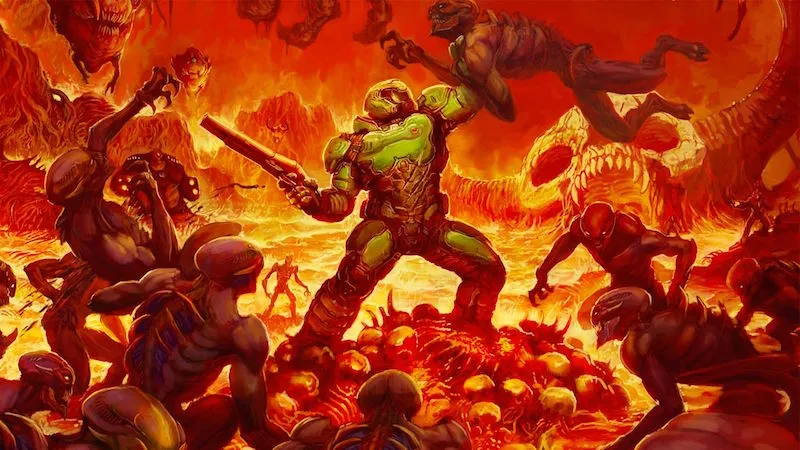
Along with several sequels, a comic book series, a board game, a live action movie staring The Rock and a book, Doom has spawned several clones, most notable, and actually worthy, of which are Rise of the Triad and System Shock. Another similar game worth considering, using the Build engine would be Duke Nukem 3D. This oversaturated the market, making the genre stale, a spell that would be broken by Half Life, a game I cover just as in depth as Doom, HERE. Shilling aside, it also generate so many WADs that it solidified it as a mainstay shooter for the rest of time, influencing many other games and generating the first major community and modding scene along side it.
Even though I am not the biggest fan of FPSs, I will never forget my childhood gaming, when I'd play the game at home, and when I could, at school during Information Technology class. It shaped my formative years and introduced my to this world of gaming that now occupies quite a bit of my time, along such other titles as Super Mario Bros, Half Life, CnC:Tiberian Sun, Dune II and Pharaoh. By doing so, it will always have a special place in my heart for its simple unadulterated fun and bringing me extreme joy.
What is your opinion? How has Doom impacted you? Share below! I appreciate your opinions and feedback.
Thank you for reading and keep steemin'!
Here's some fanart before you go!
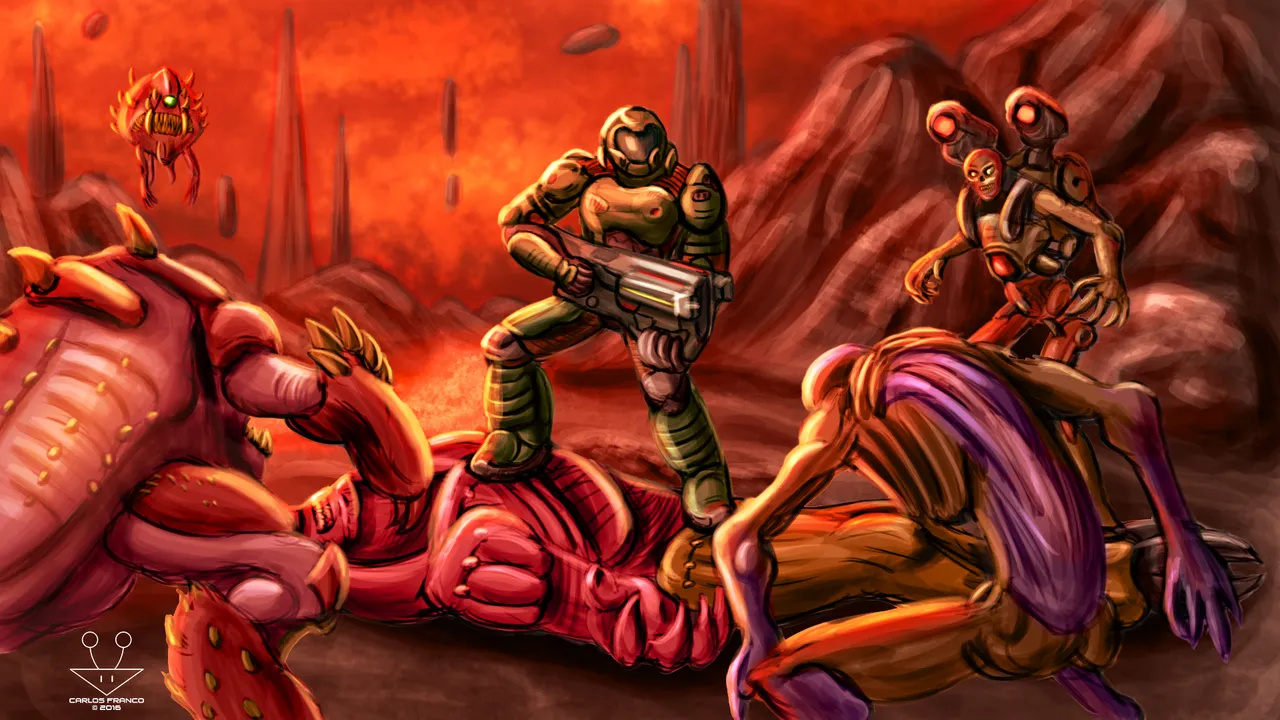
(clicking any image will take you to its source)